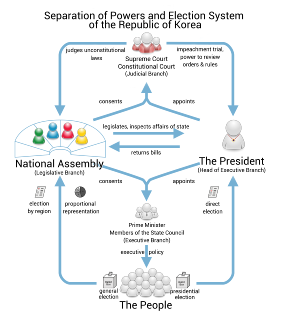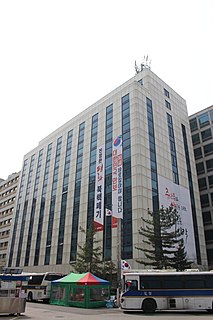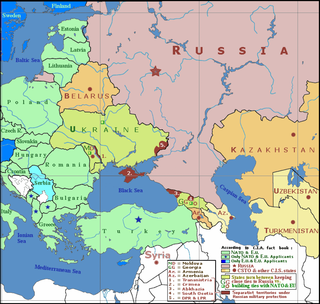Democrat, Democrats, or Democratic may refer to:

The politics of the Republic of Korea takes in place in the framework of a presidential representative democratic republic, whereby the President is the head of state, and of a multi-party system. The government exercises Executive power and Legislative power is vested in both the government and the National Assembly. The Judiciary is independent of the executive and the legislature and comprises a Supreme Court, appellate courts and a Constitutional Court. Since 1948, the constitution has undergone five major revisions, each signifying a new republic. The current Sixth Republic began with the last major constitutional revision in 1987.

The Liberty Korea Party was a conservative political party in South Korea that was described variously as right-wing, right-wing populist, or far-right. Until February 2017, it was known as the Saenuri Party, and before that as the Hannara Party from 1997 to 2012, both of which are still colloquially used to refer to the party. The party formerly held a plurality of seats in the 20th Assembly before its ruling status was transferred to the Democratic Party of Korea on 27 December 2016, following the creation of the splinter Bareun Party by former Saenuri members who distanced themselves from President Park Geun-hye in the 2016 South Korean political scandal.
This article gives an overview of liberalism in South Korea. It is limited to liberal parties with substantial support, mainly proven by having had a representation in parliament.

The politics of Europe deals with the continually evolving politics within the continent of Europe. It is a topic far more detailed than other continents due to a number of factors including the long history of nation states in the region as well as the modern day trend towards increased political unity amongst the European states.

In international relations, a frozen conflict is a situation in which active armed conflict has been brought to an end, but no peace treaty or other political framework resolves the conflict to the satisfaction of the combatants. Therefore, legally the conflict can start again at any moment, creating an environment of insecurity and instability.

New Kosovo Alliance is a liberal political party in Kosovo that is in the current coalition government made up by the PDK and AKR. The party was founded on 3 May 2006, by Behgjet Pacolli, a businessman. He is the founding owner of Mabetex, the Swiss-based project-engineering firm that has managed significant engineering projects ranging from restorations in the White House in the United States to the rebuilding of the Kremlin in Moscow.
The Grand Unified Democratic New Party was a political party of South Korea. It was known as the Future Creative Grand Unified Democratic New Party until 5 August 2007. It was formed out of the Uri Party and its resulting splinter groups. Chung Dong-young was the UNDP candidate in the 2007 South Korean presidential election; he lost to Lee Myung-bak. On February 17, 2008, the party merged with the Democratic Party to form the United Democratic Party.
Sovereign democracy is a term describing modern Russian politics first used by Vladislav Surkov on 22 February 2006 in a speech before a gathering of the Russian political party United Russia. According to Surkov, sovereign democracy is:
A society's political life where the political powers, their authorities and decisions are decided and controlled by a diverse Russian nation for the purpose of reaching material welfare, freedom and fairness by all citizens, social groups and nationalities, by the people that formed it.
Conservatism in South Korea is chiefly associated with the People Power Party. Traditional South korea conservatism is a political and social philosophy characterized by Korean culture traditions originating from Confucianism in korea, pro-business, opposition to trade unions, strong national defense, free trade, anti-communism, pro-communitarianism, pro-economic interventionism but anti-welfare state. Until May 10, 2017, the conservative Park Geun-hye government was the last conservative government of the Sixth Republic of South Korea.

The Democratic Party, formerly the New Politics Alliance for Democracy (NPAD), is a centrist, liberal political party in South Korea.
Progressivism in South Korea is broadly associated with social democracy, left-wing nationalism and communism.

South Korea's 21st legislative elections were held on 15 April 2020. All 300 members of the National Assembly were elected, 253 from first-past-the-post constituencies and 47 from proportional party lists. They were the first elections held under a new electoral system. The two largest parties, the liberal Democratic Party and the conservative United Future Party, set up new satellite parties to take advantage of the revised electoral system. The reforms also lowered the voting age from 19 to 18.
The Bareunmirae Party, also known as the Bareun Mirae Party and Bareun Future Party, was a South Korean liberal-conservative political party. It was founded in 2018 by merger of the centrist liberal People's Party and the conservative Bareun Party.

The Onward for Future 4.0 was a South Korean political party.
This page is based on this
Wikipedia article Text is available under the
CC BY-SA 4.0 license; additional terms may apply.
Images, videos and audio are available under their respective licenses.







